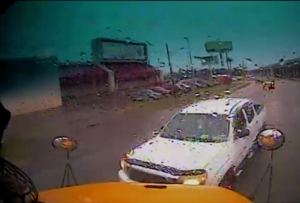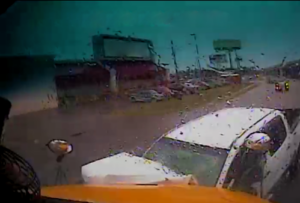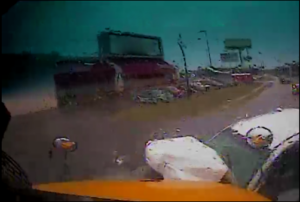Background
A school bus crossed into oncoming traffic and struck the left-front corner of a pickup, resulting in a delta-V, or change in velocity, of 41 mph as reported by the pickup’s event data recorder (EDR). The pickup’s driver (steering wheel) airbag deployed, as did the pretensioner (the device that tightens and locks a car’s seat belt in place during a crash). The pickup’s driver was unbelted, struck the driver’s side A-pillar grab handle with her head, and sustained multiple injuries, including extensive fractures in the legs.
Experts from the Rimkus Biomechanical Engineering team were retained to evaluate the occupant’s dynamics in the collision and determine how the occupant’s injuries would have differed if she had been properly restrained.



Services Provided
Our biomechanical experts assessed the injury potential based on occupant kinematics for a properly restrained driver compared to the actual diagnosed injuries for the unrestrained driver.
On this particular matter, our experts employed a holistic approach to vehicle accident reconstruction that included an in-depth analysis of dash camera footage, EDR data, and a comparative damage analysis, coupled with vehicle collision dynamics modeling and MAthematical DYnamic MOdeling (MADYMO) occupant simulations to answer the biomechanical questions regarding the injuries related to the lack of seatbelt use.
MADYMO is a well-accepted software that uses physics to model vehicle occupant kinetics and kinematics in crash analyses and assess the role of occupant safety systems. It allows us to simulate the circumstances of an accident, including the dynamic behavior of the occupants within a representative vehicle interior model. In other words, utilizing measurements of the vehicle and occupants, MADYMO creates a 3D model to help visualize the motions and mechanisms that an occupant would sustain during an accident.
This software can also develop a series of tissue load metrics that can be assessed against reference values to understand the forces and mechanisms that the tissues would undergo during an accident where the occupant was not belted properly, as well as the changes in those forces and mechanisms that would be achieved with the proper use of seatbelts.
Our experts used MADYMO to depict the circumstances of the accident without the use of the seat belt and then again with occupant using the seat belt, which produced videos and data showing a reduction in the forces transmitted to the occupant when the seatbelt was properly worn.
Using this modeling, we delivered charts showing relative reductions in occupant motion and pertinent injury criteria as well as a detailed report that described how the injuries would have been altered or mitigated with seat belt use. This report showed that many of the reported injuries would have been reduced in severity or unlikely to occur at all if the occupant had been wearing a seat belt properly.
Within one hour of the opposing counsel receiving the MADYMO modeling output from the Rimkus team, the case was settled.
Contact Us
For more information on how MADYMO can be used, please contact:
Dr. Kelly Bosch, Senior Consultant